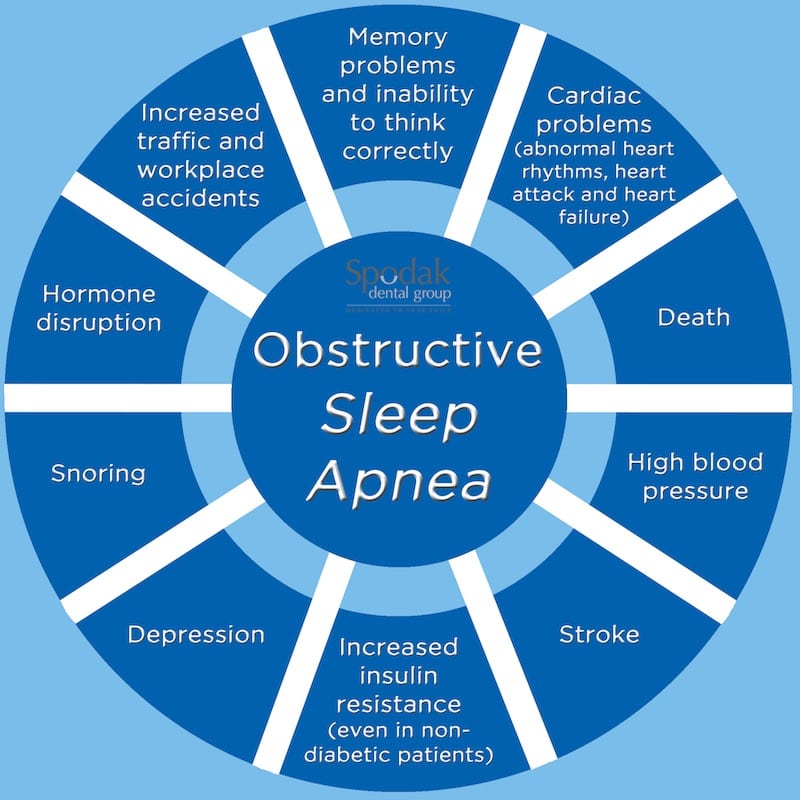Are you tired of waking up tired? Many Americans have poor sleep habits and think that they are just destined to have poor sleep. But, there may be a deeper issue that is keeping you from sleeping well, and one that can cause bigger issues: sleep apnea.
An estimated 22 million Americans suffer from sleep apnea. Out of those people, approximately 80% of cases of moderate or severe sleep apnea are undiagnosed. If you don’t know you have it, how can you treat it?
If you feel you suffer from some of the below symptoms of sleep apnea, contact Spodak Dental Group and we’ll be happy to get you on a better track to happy and healthy sleep.
1. Heavy Snoring
While you may not realize that you snore heavily when you’re sleeping, it’s a good idea to ask a loved one or partner if you do. While heavy snoring doesn’t automatically mean that you have sleep apnea, many people who have sleep apnea are heavy snorers.
2. Waking Up at Night
If you find yourself getting up during the night to go to the bathroom, this could be due to the scientific reactions that occur when your airway is blocked off for a period of time. Other than that, you might find that you wake up gasping for air after your airway is blocked and then unblocked.
3. Poor Sleep Quality
Sleep apnea occurs when the muscles in the back of your throat relax. When the muscles relax, your airway narrows or closes as you breathe in. When you can’t get enough air, your brain senses the inability to breathe and briefly rouses you from sleep so you can reopen your airway.
You might snort, choke or gasp when you wake up, and this can repeat more than 30 times each hour, all night, impairing your ability to get the sleep, restful sleep you need. This causes you to wake up tired and feel tired throughout the day.
4. Memory Problems
REM sleep is the deep sleep that helps us feel refreshed and fully rested in the morning. Those with sleep apnea don’t tend to get enough REM sleep and research suggests that REM sleep is directly linked with having an effective memory.
How Sleep Apnea Can Affect You
5. Dry Mouth or Sore Throat
If you find that you wake up with dry mouth during the night and/or in the morning, this might be due to sleeping with your mouth open. Sleeping with your mouth open is very common for people who suffer from sleep apnea and who are trying to breathe more oxygen while sleeping.
6. Do You Have One of These Conditions?
• Heart disease
• Diabetes
• High blood pressure
There’s a two-way correlation between these and other conditions so if you have these conditions, you’re more likely to also have sleep apnea and vice versa.
The sudden decreases in oxygen levels that occur when a person stops breathing places a burden on the cardiovascular system, which works harder in an attempt to deliver sufficient oxygen to all tissues. This strain causes the development of high blood pressure in approximately half of those suffering from sleep apnea, and this increases the risks of stroke and heart failure.
7. History of Fender Benders
Believe it or not, chronic sleep apnea can reduce coordination and reaction time. This often leads to more frequent minor traffic accidents. If you’re tired, you’re not concentrating fully, and you have a great chance for slip-ups on the road.
8. More Than a Few Drinks a Week?
Dependence on alcohol can increase risk of sleep apnea because alcohol drys out the mouth, leading to snoring. Additionally, the use of alcohol, sedatives or tranquilizers relax the muscles in the throat, which can worsen sleep apnea.
9. You’re a Man
Men are nearly three times more likely to have sleep apnea than women. However, women increase their risk if they’re overweight, and their risk seems to rise after menopause.
10. You’re Over 40 Years Old
Sleep apnea becomes more common as you age. Collagen in the throat loses its elasticity over time and can lead to a collapsed airway, making it more difficult for you to breathe.
11. You’re Overweight
Obesity is the biggest warning sign for sleep apnea. Fat deposits around your upper airway can obstruct your breathing, and people who have thicker necks might have narrower airways.
Conduct Your Own Sleep Apnea Self-Assessment
Do the above sleep apnea warning signs sound familiar to you? Reach out to your dentist immediately.
The first step is to take a 3-minute sleep apnea screening test to determine your risk level (minor, moderate or severe). Then a sleep apnea home sleep test will determine just how often you stop breathing and then wake up throughout the night.
Your Dentist Can Recognize More Warning Signs
There are other sleep apnea warning signs that your dentist can recognize, including a large tongue, small jaw bones, large neck, deviated septum, and more. Your dentist will also take a look at your medical history to see if you, snore and have high blood pressure, and make the link that you might have sleep apnea.








 Patient Forms
Patient Forms
